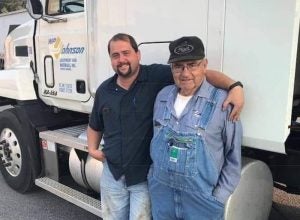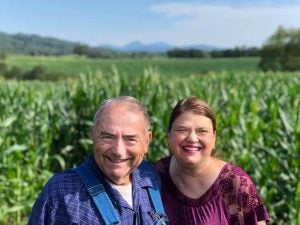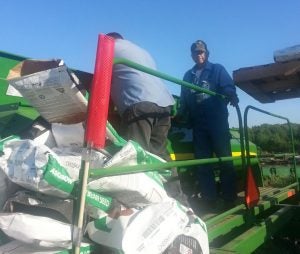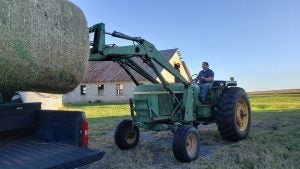After a father’s untimely death with no succession plan, the challenge for his son intensified
What W.P. Johnson Jr. starved for most this harvest season was a cussin’ — the kind of get-your-head-on-straight diatribe best doled out by a father who knew that you knew better. It typically happened when W.P. wasn’t quick enough to beat the weather or hadn’t gotten the machinery set up just right.
And a cussin’ was certainly said a lot sooner than the simple words, “Good job.”
Instead, as W.P. shouldered a seemingly expansive burden of farming and family life, the stern voice so familiar all his life has gone silent. In March, without a formal succession plan in place, W.P.’s father, Bill Johnson, died unexpectedly at the age of 78.
“How do you tell someone that you miss a straight-up cussin’? It doesn’t make sense,” W.P. says while sitting at his dining room table, just one day after what would have been his father’s birthday. “But that’s the connection you strive for, that guiding light when you’re all on your own.”
Bill Johnson had grown wheat, soybeans, and hay on 500 acres in Bedford County, Virginia. He was the kind of farmer who worked seven days a week, always wearing his trucker hat and bib overalls — the chest pocket carrying a wallet nearly bursting with receipts and other odds and ends. Sometimes, during a chilly morning, he’d wear his WP Johnson Trucking jacket, referencing the other business he operated from the farm.
Around strangers, Bill kept his guard up, displaying a rough exterior and a wary disposition. For those he knew well, the walls came down, and the purchase of a round bale of hay commonly came with 30 minutes of chit-chat — free of charge. Bill held an unwavering work ethic and believed that your word was your bond. His widow, Judy Johnson, describes him as a Type A personality, a problem solver, and sometimes restless to the point of pacing a room while waiting on the weather to clear.
Bill enjoyed telling stories about the land’s history, first as a dairy and then as a beef operation, before it switched exclusively to crops once W.P. finished college. Bill liked to smile and had a soft spot for children. He was tickled to talk about his grandkids, and he made sure they had everything they wanted, in addition to everything they needed.
He was also immensely proud of his son, even if he didn’t always tell W.P. directly.

Prior to his death, Bill farmed the same land his father and grandfather had farmed, with some additions. It is called Wilmont Farms. The two-story farmhouse that Bill grew up in stood within a few yards of his tractor barn and grain bin until just a couple of years ago, when the blighted structure was razed over safety concerns for W.P.’s kids.
For his part, W.P. worked alongside his father for most of the past 15 years and maintained a full-time job with the U.S. Department of Agriculture’s Farm Service Agency. For much of that time, W.P. lived with his wife and kids on an adjoining property, purchased after another family member passed away.
It’s impossible to replicate Bill’s more than seven decades’ worth of skill, knowledge, and understanding of the land, but W.P.’s close location and involvement positioned him to ascend into the void left by his father.
“If you are a family member walking in trying to do what I’ve done, and you were removed from the farm, that would be really tough,” he says. “All of the vendors I deal with financially have been friends with me for 15-plus years. They know who I am, they know my payment history.”
But it wasn’t seamless. Nothing in farming ever is.
Within a month of Bill’s death, W.P. needed to plan for planting the season’s crop, all while trying to secure operating and equipment notes, reviewing the farm’s financials, and dealing with other transition steps.
“To take the 30 days after your dad’s passing and having to fight for all this instead of mourning him, it’s not an easy pill to swallow,” W.P. says. “The first week was the roughest. I had trouble going back to the barn. It wasn’t right without him there.”
The family owned the farm outright, and the operation was current on all equipment and crop-related payments. Yet just about everything was in Bill’s name.
“I was a little skittish about how that was going to look, particularly having increasing operating debt because of taking over farming work, but not technically having increased assets — all of the equipment, all of the real estate, that went to Mama. I didn’t get any of that,” W.P. says. “The fixed expenses that are left will blow your mind.”
Bill owned not only the farm but also the trucking business, which specialized in hauling oversized freight, which paid a premium. W.P. knew the farm much better than the trucking business, but he managed to wade through the books.
To the family’s credit, all of Bill’s debt was tied to equipment, not to the land — which means selling off the farm itself wasn’t something that needed to be considered.

Judy now solely owns the tractors, trucks, combine, and most of the other machinery, while W.P. owns several of the implements — he jokes that he owns a head cart but not a combine — and some other fixtures. W.P. knows the equipment well; he was first taught to work on trucks when he was just 5 years old.
In the absence of his father, a man who had always provided a layer of security and comfort, W.P. took up the mantle of this operation. He knew he would be vulnerable, perhaps even a little childlike in approaching this challenge.
“When that person who has been your blankie or your teddy bear is gone, it puts a different spin to it,” he says. “You never know if you’re making the right decision or the wrong one, and you don’t have the experience of the 50, 60, 70 years that he had to go with it. You have your own experiences, the idea of, ‘What would Dad do,’ but all that goes out the window because you feel like you’re flying by the seat of your pants.”
Through the summer and fall, W.P. struggled to balance his full-time day job with managing the farm, from meeting vendors and returning phone calls to spearheading repairs and handling harvest.
“I think there are times when he got overwhelmed and expected us to know what we were supposed to be doing, how we were supposed to help without him telling us what to do,” says Amy Johnson, W.P.’s wife.
She grew up around livestock and works full-time as a nurse practitioner. Despite a few crop-science classes in college, grain was not intuitive for her.
“It was a lot of trying to understand that he needed to tell us where he needed help, and what he needed help on,” she says.
As is often said in the South, it led to a few come-to-Jesus moments for the family.
W.P. had the foundation to make the farm work, but what he didn’t necessarily have was the time. He stayed on as executive director of the Farm Service Agency’s county office, and those office-day hours would force him to mow late into evenings or rise at 2 a.m. to work in the fields. Part-time help, even during harvest season, was sporadic at best — and qualified help was even rarer. Oftentimes, his best option for was to trade work with another area farmer, someone who he wouldn’t have to train for the job.
“Before all of this, I could go to bed and pretty much sleep through the night. Now, I spend a lot more of those hours thinking about which payment is coming up next and how to make it all work,” W.P. says. “You spin it five different ways, and there’s a lot of stress that crops up.”
Having Bill in his life allowed a lot more flexibility. Grandpa would meet the kids at the bus stop after school, and he could take care of them overnight when W.P. and Amy went to a Farm Bureau event together. Now, the couple have to attend such functions separately, and neither can play the role of supporting spouse as readily.

Bill’s schedule also gave him advantages on the farm that W.P. doesn’t have. Being able to load hay at a moment’s notice provided a strong commitment to his customers. He was also adept at going into town and wheeling and dealing for any machinery parts he needed, sometimes for days if it meant saving a few bucks.
“I’d tell him we’d need this part or that part, and I’d give him the number, and he’d handle all that. And he loaded hay for everybody. Those were his two things,” W.P. says. “He either saved money on expenses or made money with an extra hay sale because he had those opportunities.”
W.P. can’t put that kind of time into that aspect of the business. He does what he can, with the tools and opportunities he has available. He wishes a succession plan had been in place. Ironically, W.P. is something of an expert in Virginia on farm transitions, but he could never persuade his father to go along with it. To the elder Johnson, his word meant everything, and that’s all that mattered.
“I wanted Dad to have a true transition plan, where we had a solid entity transition, where all we had to do was flip shares, and everything would have stood on its own,” W.P. says. “But he may want to go one way with something, and regardless of what a piece of paper says, if it’s not what he expected, he didn’t want to do it. And that’s not necessarily how some of these systems work.”
Bill was stubborn about a lot of things, including succession planning. He had been sore about such things after getting burned on double taxation related to his trucking business decades ago when it was established as a C corporation.
“He stuck to it because of his hard-headedness, but the truth is, we wouldn’t be here today if he wasn’t so hard-headed,” W.P. says. “The transition has created challenges, but luckily, myself, my sister, and my mama, for the most part, agree. Mama wants it to come to us as kids, but she just doesn’t know how that’s going to look moving forward.”
She’s not alone. Many pre-Boomer farmers (aka the Silent Generation) don’t have succession plans. USDA data from 2013 show just 29 percent of farms have such plans in place, but much work has been done nationally to improve that rate.
Through his work at the Farm Service Agency and with the Virginia Farm Bureau Federation, W.P. sees the trend shifting, as younger generations recognize the value of planning.
“If I get to live that long, my kids won’t have that same headache,” W.P. says. He’s seeing more LLCs and Inc.’s popping up, largely so families can build a growing operation under a succession plan.
With this farmland in the Johnson family for so many generations, they feel relieved that the land is paid for. Nothing points to the need to sell acreage in order to cover expenses. W.P. says that, should a real crisis happen, he and his mom own enough equipment to pay off all the debt. Of course, that would mean the end of the farm, and nobody hopes it comes to that. Still, selling machinery is better than the alternative.
“Dirt’s not for sale. I might have to sell some equipment, but the dirt’s not for sale,” W.P. says. “Too many generations have worked too hard to get the land the way it is.”
The farm is unlikely to remain as it was under Bill’s leadership, and, in fact, it’s already begun to change: There’s now zero focus on the trucking side of things. The weekend W.P. finally got the last of Bill’s truck repair projects to the point where they could be dragged away, the farm’s workshop quickly switched from Macks to John Deeres.
“The tractors now come first, instead of the trucks. The tractors are the ones paying the bills,” he says.
He’s learned more and more over the past few months that things need to be done his way, in whatever way he’s most comfortable doing it. It’s been happening in recent years anyway, as the farm has added more crops in between the wheat and soybean rotation that Bill spearheaded.
“When we started, we were just wheat, wheat, wheat,” W.P. recalls. “And we got one check a year, and we had to make a go with only that. Then we went to wheat and beans, and we got two checks a year, and that was like, ‘Yay, we get Christmas presents!’ Nowadays, there’s even more going on.”
W.P. has led the shift to doing more with hard wheat, while Bill leaned toward soft wheat varieties. Also, Bill hated barley because, as a younger man, he had to combine it from an open-air cab, and he complained that the stuff itched fiercely. Today, sure enough, the farm grows barley, 140 acres of it, between its main cash crops. Other covers and silage crops are grown, too.

W.P. has been doing things at his pace — more wheat is stored in the bin because he doesn’t have the time to direct-ship it like his father did. The year’s first hay cutting happened in early April, far earlier than Bill ever would have done.
This is how a young farmer takes over his father’s legacy, how the essence lives on. Small things still trigger emotions, and many days, the sunlight doesn’t look the way it did a year ago. There’s more burden, though less time; more freedom, with less routine.
“You hear about farmer mental health a lot lately — just recently, I heard about a nearby farmer who was struggling to make ends meet, to protect his family, and he took his own life,” W.P. says. “It’s been tough for us, but not that tough. Still, I think there are ways we can deal with it better so you don’t have to wake up in the middle of the night sweating wondering where the next paycheck is coming from.”
Ryan Tipps is the managing editor for AGDAILY. He has covered farming since 2011, and his writing has been honored by state- and national-level agricultural organizations.



